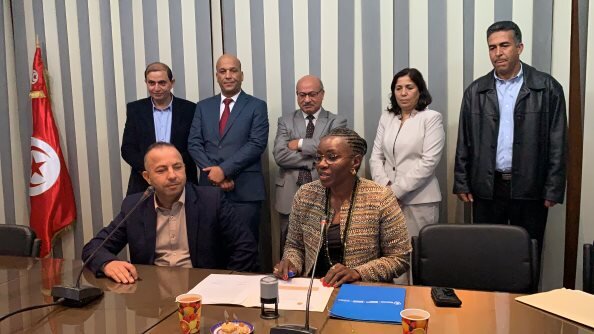WFP supports agricultural development in Tunisia through school meals

The ceremony took place at the Governorate House in Siliana in presence of Governor Abderrazak Dekhil, regional representatives of the ministries of Agriculture and Education and WFP Representative and Country Director in Tunisia Fatimata Sow Sidibé, and the International Fund for Agricultural Development (IFAD) Representative in Tunisia Zine El Abidine Ghoudi.
WFP has been requested by the Government of Tunisia to provide technical assistance and capacity-strengthening activities; in the framework of the International Fund for Agricultural Development PROFITS project that aims to improve the living conditions of vulnerable rural populations in the southern Siliana region by developing agricultural value chains.
WFP will support the development of the capacities of smallholder farmer families to manage their own future, by reinforcing their technical and marketing skills. The CRDA Siliana is the implementing entity of the multi-year PROFITS project, which is valued at US$34 million.
The agreement falls within the scope of the WFP five-year plan in Tunisia (2018-2022) which aims to strengthen the capacity of national institutions to implement enhanced school meals and social protection programmes; with a main focus on improving the National School Feeding Programme (NSFP).
“Providing balanced and nutritious school meals to vulnerable children, based upon locally grown ingredients in Siliana, will allow them to reach their full potential as teenagers and young adults,” said Sidibé. “And by linking smallholder farmers to school canteens, we will be supporting the rural economy and contributing to the sustainability of the National School Feeding Programme.”
Since 2013, and as a result of WFP’s collaboration, the Tunisian government has strengthened its commitment to school feeding as a social safety net that can catalyse improved access to education and nutrition as well as contributing to local development and employment in rural areas, in line with a home-grown school feeding approach. The NSFP is run by the Ministry of Education and benefits 260,000 children (125,000 girls and 135,000 boys) attending 2,500 primary schools across the country. Almost 90 percent of these children live in rural areas such as southern Siliana.
# # #
The United Nations World Food Programme - saving lives in emergencies and changing lives for millions through sustainable development. WFP works in more than 80 countries around the world, feeding people caught in conflict and disasters, and laying the foundations for a better future.
Follow us on Twitter @wfp_media @wfp_mena
Topics
Tunisia School mealsContact
For more information please contact (email address: fatimata.sow-sidibe@wfp.org)
Fatimata Sow Sidibé, WFP/Tunis
Tel. +216 71 967 300, Mob. +216 58 439 894
